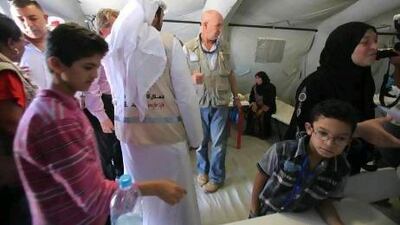MAFRAQ, JORDAN // International organisations in Jordan have pleaded for more aid, particularly to help Syrian refugees cope with the coming drop in temperature in the desert winter.
Representatives from the International Organisation for Migrants, the United Nations High Commissioner for Refugees (UNHCR), the Jordanian Red Crescent and the World Food Programme toured the Emirati-Jordanian Field Hospital yesterday.
They said about 200,000 refugees are now in Jordan, with more than 32,000 of them in the Zaatari camp. They have faced many problems at the camp, including riots and protests among refugees.
With winter arriving, more aid is needed to help refugees to endure desert nights when temperatures drop to below 0°C.
While the UAE has so far provided 100 containers to replace tents, many other countries have not yet stepped in.
"We need more containers," Andrew Harper of the UNHCR said. "In winter it is also windy. It can destroy the tents."
Mr Harper said the camp needed proper foundations and stable electricity as the days get darker.
Refugees are already suffering from the desert night's cold. One man, Obaydah, said his family closed the tent they lived in from all sides at night so as to not allow in any air, yet they are "freezing".
"With a lot more violence in Syria, we cannot wait for people to cross," Mr Harper said. "We know they are coming so we need to be prepared."
Although grateful for food donations, he said organisations should work more to collect containers, as food is easier to collect locally.
"Our biggest challenge is that we don't know when they are going home," he said. "And they don't know either."
Mr Harper said the number of refugees entering Jordan had dropped to between 500 and 600 a day, but he expected many more to arrive soon with the increase of violence.
Many are trapped in their homes, unable to leave Syria. Previously, as many as 3,000 would cross the border overnight.
Newly arrived refugees said thousands of Syrian families were living on the border waiting to be let through, but many of them have been pushed away for not having enough money to bribe security.
Families prefer crossing the border through official channels, even if it means paying all the money they carry, to the risk of being fired at like others who are smuggled across.
"It could go back to 2,000 or 3,000 very quickly," Mr Harper said, stressing the need for proper shelter.
Organisations also said overall aid was low, and far less than they have pleaded for previously.
Ali Bibi, cooperation manager of international relations of refugees for the UNHCR, said the organisation had only received about 30 per cent of the US$23million (Dh84.4m) it requested this year. Mr Bibi said it was not enough to accommodate the growing number of refugees, and that by the end of the year, they would need at least $700m to support them.
The Jordanian government has also expressed concern.
In an official statement printed in the newspaper Al Dastor, the Jordanian prime minister said yesterday that supporting the refugees was the government's biggest expense.
"Jordan is facing challenges," Mr Bibi said. "They have limited resources, scarce water. For a huge challenge it has dealt with it well."
He said the country's schooling and health facilities were just two sectors affected by the large number of refugees, as they were both providedfree.
But some refugees said they had been denied school access.
Mr Bibi said rents had also increased to keep up with demand, affecting Jordanian nationals.
Mr Harper said the UAE was one of the fastest countries to provide help.
He added that the Emirati-Jordanian Field Hospital was the largest such clinic provided to the refugees, with more specialities than the other field hospitals.
"It is the best in the world, in terms of field hospitals," Mr Harper said.
David Terzi, director of the International Organisation of Migrants in Jordan, said that when he entered the hospital he felt as though he "was in Switzerland".
The UAE has also provided 10,000 blankets to families in preparation for winter, along with 70,000 food and basic medical equipment containers, 1,000 heaters and 10,000 date containers.
Sheikha Fatima, widow of the UAE's Founding President Sheikh Zayed, sent a plane two days ago filled with 45,000 tonnes of clothes.
And a plane filled with 95 tonnes of aid was sent by the UAE Red Crescent.

